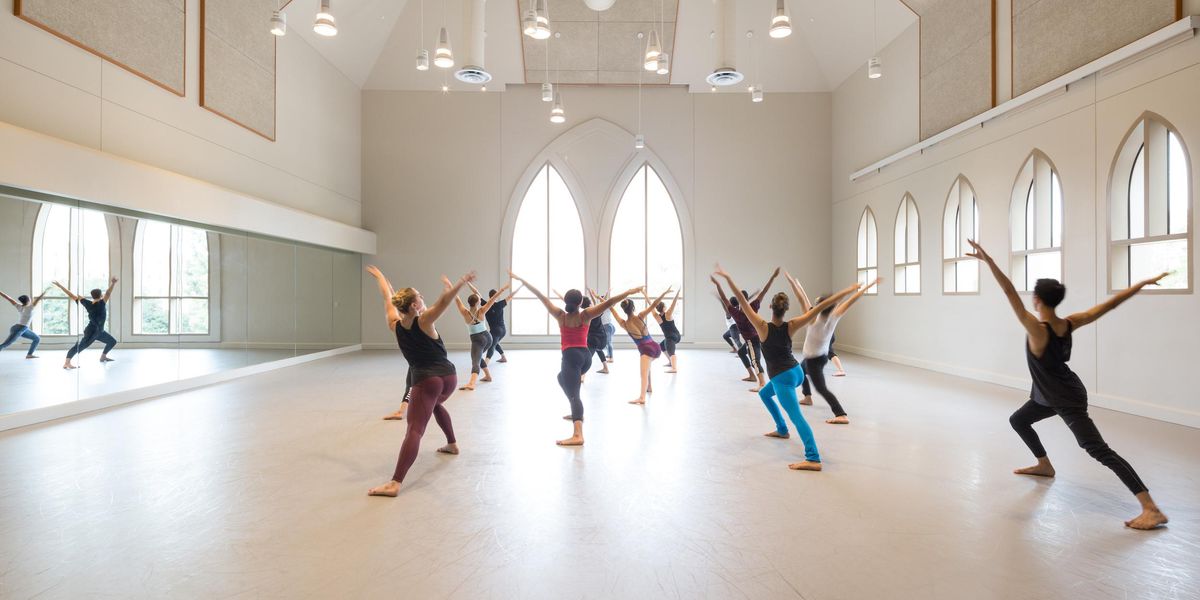The Intern Advantage
Browne (right) with Brandon Cournay in a Keigwin + Company rehearsal. Photo by Whitney Browne, Courtesy Keigwin + Company.
In the summer between her junior and senior years at Connecticut College, Kim Lusk took on an administrative internship with Velocity Dance Center’s Strictly Seattle program. “I wanted to dance professionally,” she says. “So I saw this as a perfect opportunity to be involved in and surrounded by the dance scene.” Perfect it was: Not only did her internship lead to a full-time job as Velocity’s programming coordinator, but it also introduced her to choreographer Zoe Scofield, whom she now dances for.
Interning at a dance organization is a savvy way to prepare for and make connections with the working world. Whether it’s a position in finance, marketing or administration at a dance company, studio or performance venue, these temporary positions teach valuable skills and offer an exclusive peek into how a dance organization works—giving college students an advantage when it’s time to search for a job.
The Ins and Outs of Interning
Spending a whole semester behind a desk may not sound like the perfect gig for a dancer, but learning about the inner workings of a dance organization can be more useful and interesting than you might assume. Lusk worked 20 hours a week, helping with registration and producing studio schedules for Velocity’s Strictly Seattle summer intensive. “The office was essentially one big room,” she says, “so I could hear everything that was going on, from the development team discussing tactics to the artistic director making decisions.”
Ashley Browne, now a dancer with Keigwin + Company, says her internship with Robert Battle’s Battleworks Dance Company (which has since dissolved) helped her appreciate all the work that goes into running a company. She assisted with marketing materials, fundraising and day-to-day e-mailing and paperwork. “Interning made me appreciate that being a dancer is a team effort,” she says. “Without all the moving behind-the-scenes bits, you don’t have a functional machine.”
How companies compensate their interns’ time varies greatly. Browne was paid $200 a month to work four to six hours a week. This is rare, though, as most internships in the dance field are unpaid. But they can often be taken for academic credit, or underwritten. As a University of Iowa student, Krista Ellensohn supported her summer internship at Hubbard Street Dance Chicago with a grant from the Kemper Fellows Program. And Connecticut College gave Lusk a stipend for her time at Velocity.
Regardless, internships offer many perks, like unlimited dance classes and tickets to company performances. “I took dance every night,” says Ellensohn, who kept in shape that summer dancing at Hubbard Street’s Lou Conte Dance Studio. “And my supervisors were flexible, so if there was a class or audition that came up that I wanted to make a priority, I could do it and then come back down to my desk.”
Moving On Up
Dancers sometimes dream of doing nothing but performing after graduation, but the reality is that most must find stable side jobs to supplement their income. Internships are a big resumé builder, and companies often look to high-performing interns to fill open positions. “It became clear that administration was going to pay my bills,” says Ellensohn, who now works at Hubbard Street full-time, managing the company’s pre-professional programs.
Sometimes internships can even lead to unexpected dance work. During her second and third summers interning at Velocity, Lusk decided to also dance in the Strictly Seattle program she assisted her first year. Through it, she performed a piece by Zoe Scofield. By the end of her third summer, Scofield asked Lusk to join her company zoe | juniper. Similarly, Ellensohn found her current dance job by taking Trae Turner’s hip-hop class at Lou Conte. He chose her for a promotional video for Step Up Revolution and eventually asked her to join his Boom Crack! Dance Company.
Regardless of where an internship takes you, the skills you learn will often prove valuable. Take Browne, who was recently named company manager at Keigwin. She has also had the opportunity to set the choreographer’s rep on other companies, most recently the Royal New Zealand Ballet. “While there, I’d schedule the rehearsal week and figure out the puzzle of casting dancers within a mixed bill. I had to understand the production side of things to be able to do that,” she says. “I use the skills I learned as an intern every day.”
Make the Most of Your Internship
Landing an internship doesn’t guarantee that you’ll be able to stay on full-time once it’s finished. But there are ways to prove your worth. Here are Keigwin + Company dancer and company manager Ashley Browne’s top tips.
1.
Don’t let boredom or frustration get to you. “Patience isn’t just a virtue, it’s a skill. Especially at an emerging dance company, people may be making things up as they go, so you’ll have to bear with them.”
2.
Try something new. “Don’t be afraid to be the one to make a first draft,” says Browne. Often, interns don’t think they should reach beyond their given to-dos. Be adventurous and take initiative. It will spark the company’s interest.
3. Speak up. “If you know what you’re good at—whether it’s writing or balancing a budget—don’t be afraid to tell your supervisor.”




